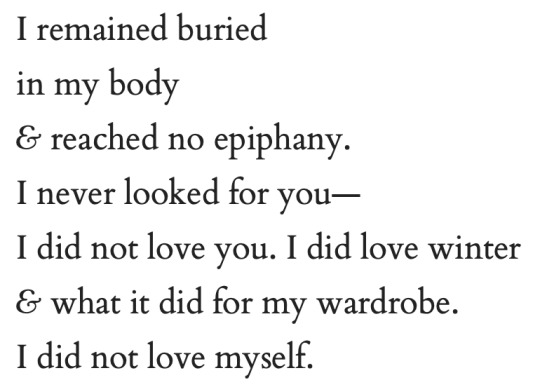#Palinode
Text
“But maybe life’s not meant to be all grand
And maybe lows are there to help us grow”
it wasn’t quite right, what I wrote before—
but I let the poem put up a fight,
and left the line that made me sigh
(there’s a rhyme to the reason,
and the reason was rhyme)
the line that I penned shouldn’t have been:
the pretty words did not have
the pretty facts to have their backs and
the wisdom that glowed and flowed before
I find I really must retract.
What I should have said is:
The valleys exist
not to teach us a lesson,
but because they do.
This does not change much—
sometimes you have to cross them
(you can, and you will)
and maybe sometimes
you have to journey alone
(but mostly you don’t)
The lows are not there
to test you, or force your growth,
strengthen you through pain—
ebbs are natural.
You will encounter many,
and you will survive.
Your life means something special
at every elevation.
#poetry#spilled ink#palinode#NaPoWriMo#napowrimo2023#prompt#write a palinode in which you retract a sentiment from a previous poem#this was interesting and hard and my brain hurts now#but I kind of like how I switched from one style to my usual senryu/tanka at the end#we did it!!! another April filled with poetry !!
33 notes
·
View notes
Photo

Mira Rosenthal, from “The Palinode’s Ethics of Questioning” (Poetry Northwest)
It’s important to differentiate between the kind of retraction or disavowal a palinode performs and the more generalized notion of holding contradictory opinions simultaneously, made the darling of poets by Whitman himself: “Do I contradict myself? / Very well then I contradict myself, / (I am large, I contain multitudes.)” Or, my preferred darling by Czesław Miłosz:
The purpose of poetry is to remind us
how difficult it is to remain just one person,
for our house is open, there are no keys in the doors,
and invisible guests come in and out at will
Yes, we are changeable and fickle and nuanced and haunted, bound to contradict ourselves. But the palinode is more pointed. It has specific work to do.
The palinode’s “I once said…” relates nicely to the broader refutation of poems rooted in “They once said…” Take, for example, W. H. Auden’s “I Am Not a Camera,” which repudiates his earlier poetry as well as Christopher Isherwood’s statement: “I am a camera with its shutter open, quite passive, recording, not thinking.” Kyle Dargan makes a similar move in his “Palinode, Once Removed” that begins with an epigraph from Richard Wright he wants to refute: “The Negro is America’s metaphor.” And Wisława Szymborska’s poetry often arises out of a preconceived idea turned inside out, such as in her poem “Lot’s Wife” (trans. Clare Cavanagh and Stanisław Barańczak) that gives us the wife’s perspective. “They say I looked back out of curiosity,” the poem beings. “But I could have had other reasons.”
#quotations#typography#poetics#palinode#mira rosenthal#contradiction#retraction#disavowal#refutation
2 notes
·
View notes
Text
Palinode to a Birds-Eye View
A journey doesn’t have to beginwith a fluttering of wings;I would rather not fly –I want to leave the skyand walk. I am not a rising larknor an owl that swoops in the dark;I prefer to skitter like a turnstoneamong limpets and cuttlebone,dashing up and down the shore.I don’t want to feather salt-washed air!I would rather use my feeton muddy fields and dusty streets,feeling the grit between my…

View On WordPress
0 notes
Text
Palinode
youtube
View On WordPress
#daily#definition#dictionary#educational#Knowledge#learning#lesson#Palinode#schoolhouse#vocabulary#word#Youtube
0 notes
Quote
What happens to the boys who burn / ourselves down? Is that where we find / the softest part?
— Azura Tyabji & Jackson Neal, from “Zuko’s Palinode,” Avatar: The Last Airbender, Dear Azula, I Have a Crush on Danny Phantom
#quote#Azura Tyabji#Jackson Neal#poetry#Dear Azula I Have a Crush on Danny Phantom#out of my collection#Zuko's Palinode#Avatar: The Last Airbender
182 notes
·
View notes
Text

Begging for some grace by @dankmalexmemes for @rnmbb
Art process under the cut
#malex#malex fanart#rnmbb#dankalexmemes#check out this beautiful slice of life story#michael guerin#alex manes#river guerin#roswell new mexico#by the ever talented palinodes on AO3#also I find art processes hilarious so I thought I'd share it
56 notes
·
View notes
Text

Jeremy Allan Hawkins, from "Notes for an Ecstatic Palinode"
716 notes
·
View notes
Text
I got curious about how Menelaos gets chosen in various sources and made a little list*:
-In the Catalogue of Women, Tyndareos chooses/Menelaos wins because he offers the most bride gifts. [The oath is Tyndareos' idea, as far as we can tell.]
-In Stesichorus' Helen (so, the probable first version of his that treated Helen and the Trojan war, not either of his Palinodes), Tyndareos chooses after exacting the oath to keep order and the suitors from fighting each other. [No way to tell if Tyndareos came up with the oath himself or was given the idea, by Odysseus or anyone else.]
-In Euripides' Iphigenia in Aulis, Tyndareos allows Helen to choose after exacting the oath as the suitors have begun threatening each other. [Tyndareos comes up with the idea of the oath himself.]
-In the Bibliotheke, Tyndareos chooses. [Odysseus is the brain behind the oath.]
-In Hyginus' Fabulae (#78), Helen gets to choose because Tyndareos is afraid of the discord that might arise and that Agamemnon might divorce Klytaimnestra. [Odysseus is again the brain behind the oath.]
*Based on checking those sources I knew mentioned it plus Gantz's Early Greek Myth, since he's thorough in mentioning if later sources talk about something even if the focus is on earlier ones.
So what we've got is that most of the time in these sources, Tyndareos is the one to choose. In the Catalogue of Women the man chosen is also the one that, on the crassest level, is the most "worthy" by having given most for the woman. (Though it's also the source that notes if Achilles had been old enough, he would have won Helen.) Of course, if there are lost sources that touched on the suitors and Helen's marriage to Menelaos, we won't know that, or what they said about it, but this is what we've got to work with, I'm rather sure.
Tyndareos choosing is of course the most "neutral"/normative option, as that would be the regular course of things. Tyndareos being the one to choose also doesn't appear to have any correlation (as far as we can tell, anyway) whether Helen left or was kidnapped. As in, there's no correlation to whether Helen is portrayed as "guilty" or not when her father has chosen her husband.
Helen choosing comes into play for the first time in Iphigenia in Aulis, and the context of it paints a rather specific picture, I'd say.
"[...] old Tyndareus with no small cleverness had beguiled them by his shrewd device, he allowed his daughter to choose from among her suitors the one towards whom the sweet breezes of Aphrodite might carry her."
"[...] carried Helen off, in mutual desire, to his steading on Ida."
First of all, of course one could probably say much since this is all part of a speech of Agamemnon's. But, if we're allowing what's being said to stand on its own (and if there is an agenda, which undoubtedly there is, it might be Agamemnon's just as much as about how the play, meta-wise, is choosing to represent this), something becomes very clear.
Tyndareos is put forth as basically tricking the suitors, and so it puts blame on him. Helen, in being allowed to choose, is made culpable since she then still desired someone not her husband and because of that desire let herself be carried off. The chorus a little later after this both uses "carried off" as well as "fled her home to marry a foreigner". It's thus not just Agamemnon who is framing it both in terms of "kidnapping" and Helen leaving because she desires Paris.
In Hyginus we have no moral flavouring of the same kind as above, since the Fabulae are so very pared down in their language. At most it's a far more neutral casting of Helen being allowed to choose than how Iphigenia in Aulis has it. (But it's probable Hyginus got "Helen got to choose" from that play, much like Euripides and Sophocles' Alexander plays are probable sources for his own account of how Paris comes back to Troy.)
The wider context in which Helen getting to choose her own husband and how it's being portrayed is actually rather important, then, being used as it is in conjunction with Helen being portrayed as desiring Paris.
And I think it's kind of interesting how Tyndareos is apparently at first perfectly capable of coming up with the idea of the oath himself, but as soon as Odysseus in later sources worms his way into the narrative, him having come up with it is the version that dominates (especially in later awareness of the story)!
39 notes
·
View notes
Text
I imagine all the
flowers we’ve trampled
are growing in paradise,
ready to forgive us.
— C. T. Salazar, from “Palinode, or Lullaby with Light and Dark,”
234 notes
·
View notes
Text
XXX. Write a palinode.
The black-capped
chickadee is singing sweetly,
“Cheeseburger, cheeseburger.”
And the sun is not even awake, so
it seems a little aggressive, or perhaps
excessive to start so early, but,
they say that the early bird gets
the worm. It seems rather
immaterial to be alive and active
at that time, and chickadees don’t even
eat worms. Better to wait for the sun
and the caterpillars and the flowers
before making a fuss. And yet
the little round fellow
outside my window
cannot, will not be contained
and is prepared to announce herself
—or himself—to the world
at any hour and
I had best get used to it,
because this is the way the universe
is arranged and
I take it all back,
I love the morning birds.
15 notes
·
View notes
Text
Was gonna write a post along the lines of “presbyteriaans are kinda really fuckable” then remembered Im wearing the cross I got earlier today and repented rescinded my statement issued a palinode. God forgive me my aphophasis. Anyway i thought about it and dont think its true
2 notes
·
View notes
Text
39/30
Response 3 to Prompt 30 , April 2023
Perhaps one way to write a Palinode could be to write a cleave poem, as Jane Dougherty suggests , where one side is the opposite in meaning to the other. It feels a bit like cheating but I had to try it out.
Title : CLOVEN
Good God ! Bloody Hell !
Is this how It can’t be
We live We die
This life ? This death ?
Angels here Demons there
try to save us try to destroy us
Are we progressing Are we regressing
to the Apocalypse ? to Chaos ?
Have we been Have we been
redeemed ? destroyed ?
Is this a fresh start? Is this the end ?
Amita Sarjit Ahluwalia
30/4/23
3 notes
·
View notes
Text
Another thing I won’t apologize for is my old writing—the stories, poems, essays, et. al. I wrote from the age of twelve on. In his poem “I Am 25,” Gregory Corso wrote of:
...old poetmen / who speak their youth in whispers, / saying: —I did those then / but that was then / that was then—
The lit world is rife with writers shunning their juvenilia, and I refuse. There are old pieces I still think are pretty damn good. And much like my youthful experiences shaped me as a person, all the writing I did back then made me the writer I am now. I think of my juvenilia the same way I think of my tattoos. There are pieces I wouldn’t write now had I not already written them, and there are tattoos I wouldn’t get if I didn’t already have them. But I have love for them, all of them. Even the wonky, faded stick n’ pokes; even the shoddily researched anarcha-feminist rants and the cheesy odes to Sid Vicious. I would only retract something I wrote if it were harmful in its language or viewpoint. Disavowing my old writing because it’s clumsy or embarrassing would be like spitting in the face of any success I’ve had. Would be like asking to have my future words snatched by a younger, braver writer.
In the penultimate stanza of “I Am 25,” Gregory Corso wrote about befriending those endlessly retracting old (poet)men, offering them reassurance that their genius can live on through him. The final stanza shows his real motive. He’d ingratiate himself to them:
Then at night in the confidence of their homes / rip out their apology-tongues / and steal their poems.
—Jessie Lynn McMains, from “rip out their apology-tongues” (Pussy Magic, April 2019)
#jessie lynn mcmains#my writing#juvenilia#poetry#gregory corso#pussy magic#i don't regret the things i've done#but those i did not do#this whole piece is sort of an anti-palinode#but i have written palinodes#and not even about things that were harmful in language or viewpoint#i guess i think of changing my mind differently than straight up disavowal#and really that's what this essay was about#people who disavow either past experiences or past writings#as though they're ashamed#not just saying 'i've changed'
6 notes
·
View notes
Text
The Poet Gives Up
Vincent might have felt differently
when he tried to paint a starless night in Saint-Remy:
the poet detests the pungency of words
stagnating in her mind like a humid day.
She sees them fall, lumpen and heavy
flocks of birds that scratch her with censorious
claws as they ascend again into phonemes,
oscillating with unsatisfactory memes.
Now she no longer writes poetry,
buds open, fresh and…

View On WordPress
0 notes
Text
Napowrimo Day 30
So we come to it at last - the final prompts of the month. I definitely found this more difficult than last year but it has been a lot of fun. I hope everyone has gotten something out of the prompts and I look forward to next year's challenge. Without further ado, here are the last prompts for Napowrimo 2023:
Official Prompt:
Today, I’d like to challenge you to write a palinode – a poem in which you retract a view or sentiment expressed in an earlier poem. For example, you might pick a poem you drafted earlier in the month and write a poem that contradicts or troubles it. This could be an interesting way to start working on a series of related poems. Alternatively, you could play around with the idea of a palinode by writing a poem in which the speaker says something like “I take it back” or otherwise abandons a prior position within the single poem.
My Prompt:
“Not with a bang, but with a whimper.” Or so the famous Eliot quote goes. As we wrap another month of prompts, I want you to consider endings. Maybe start the poem with your favourite ending line from another piece.
Lucky Dip:
Celebrate
#napowrimo#writing#creative writing#poetry#spilledink#30 poems in 30 days#writerscorner#new poets society#rejectscorner
2 notes
·
View notes
Note
Just wondering if you happen to know if there's any Malex Pride and Prejudice AU's out there, I know there's an Alex/Max one, but that is definitely not the pairing I'm interested in reading. Any help is appreciated and thanks in advanced.
ooh this is a good one. i wish we had more of these! here are the two i know of:
follies and nonsense, whims and inconsistencies by my dear friend palinodes, described as a "very, very loose Pride and Prejudice AU (at Christmas!)." modern au.
and most ardently by another dear friend lire, which is a straight up p+p au
5 notes
·
View notes